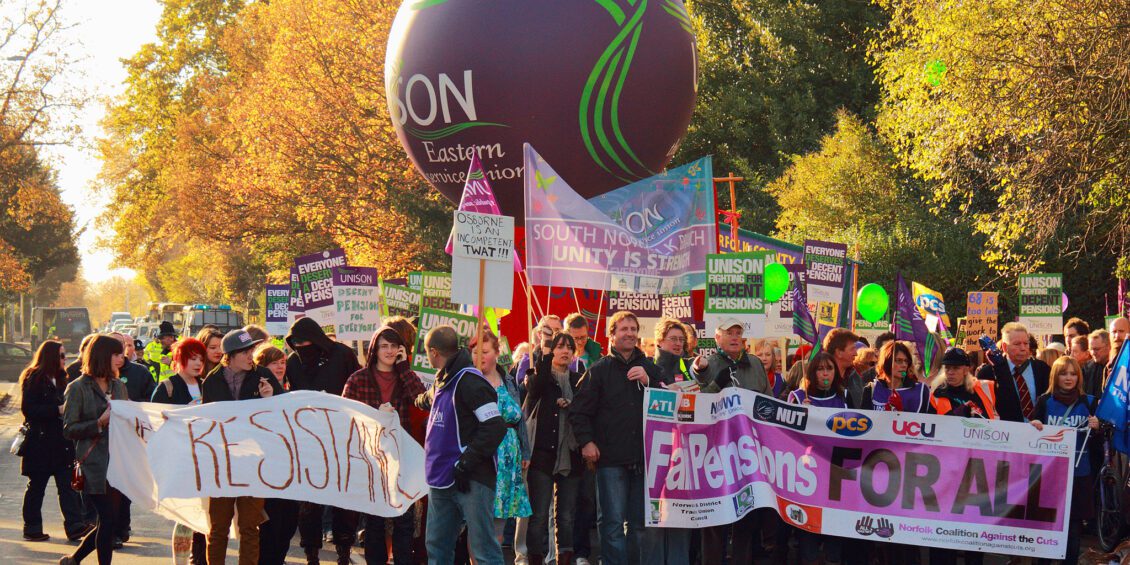
A question we get asked a lot at Politics for the Many HQ is why proportional representation (PR) is good for trade unions.
Heart Unions Week offers an opportunity to reflect on how our voting system has negatively impacted trade unionists and to embrace the opportunities that a fairer voting system might hold.
The trade union movement has always led demands for greater democracy, empowering working people and communities and offering a different vision of society. Many are now doing their bit to drive up voter registration following worrying new analysis from the Electoral Reform Society that revealed an estimated 7.6 million eligible voters are missing from the electoral register in England and Wales.
With over 6 million workers holding trade union membership, unions have a huge reach across communities. You’d be forgiven for thinking that we’d have a powerful voice in Parliament too, but our voices are being silenced by the First Past the Post electoral system.
We need to rewire the system to put wealth and power in the hands of the many, giving ordinary people collective control over the things that affect their lives. That means getting proportional representation, so working people always have a seat at the table.
Here are three things we could achieve with PR:
Legislation that supports working people for the long-term
Trade Union law in Britain is frequently described as the most restrictive in the western world. Trade union rights have been the target of sweeping reforms by right-wing governments in the UK whenever they secure power. This is what happens when we have a centralised, elitist political system.
Since 1980, under First Past the Post, there has been no less than fourteen employment and trade union acts restricting and then, to a degree, clawing back union rights. By contrast, all of the EU countries which have embedded trade union rights, and have high union density and collective bargaining coverage, are democracies which employ proportional electoral systems.
PR offers the opportunity to get new legislation for working people that cannot be swiftly undone under the see-saw system created by First Past The Post.
Workers listened to, no matter where you live
Under FPTP elections are fought in just a small number of marginal (swing) seats. This means that political parties focus more of their campaigning efforts in those areas by distributing leaflets, holding events and talking to voters. By contrast, all parties can largely ignore working people in ‘safe seats.’ The sitting MP can take their vote (and a job for life) for granted and rival parties won’t give up their time to talk to voters in what they see as an ‘unwinnable’ constituency. In these situations, parties will stand ‘paper’ candidates who are inexperienced and know little to nothing about the local area.
Under PR, where every vote will count, political hopefuls will have a reason to actively listen to the hopes and dreams, fears and concerns of as many voters as they can get to talk to. Every candidate would be fighting for every vote and previously ignored voters would have a reason to open the door and have a conversation about what matters to them.
PR has the potential to reignite local political activism and engage voters in campaigns where their voices could actually influence the national as well as the local outcome – working people could start to have a say in policymaking – how exciting would that be?
A seat at the table after the election
Although the Fixed-term Parliaments Act was repealed in 2022, it can still be a long wait between one general election and another. Under First Past the Post, we end up with either a dominant party that can force legislation through without scrutiny or a coalition that no-one actually voted for. In the 2010 and the 2017 elections, Tory governments were propped up by the Lib Dems and then the hard right DUP.
There’s been no progressive government since 2010. Instead, trade unions have been bound up in an increasing amount of red tape and those who represent the interests of working people have been unable to sway any Parliamentary vote. First Past the Post leaves trade unions isolated and working people out in the cold.
Trade unions want to see a meaningful industrial strategy that delivers high quality jobs with good pay and conditions. We want people to have security at work and a pension that enables them to live independently in their retirement. Under a fairer voting system, working people would always have a seat at the table – that makes PR an industrial issue and one worth fighting for.